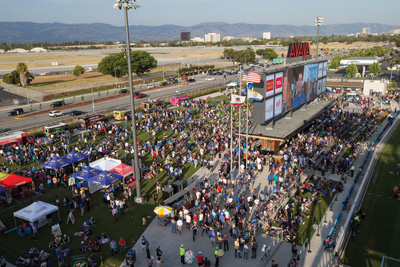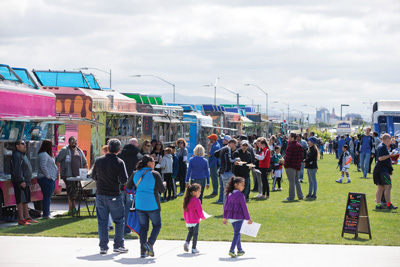The San Jose Earthquakes shake up their food offerings by activating a festive pop-up destination at Avaya Stadium.
For every home game, 12 to 14 food trucks set up shop at the 7Up Epicenter, the two-acre green space behind the massive outdoor scoreboard bar at the north end of the MLS facility.
The mobile food experience has been offered since the stadium opened in March 2015. Gates open two hours before first kick, and half of the team’s 13,000 season-ticket holders eat at the Epicenter before the game, Earthquakes President Dave Kaval said. They enjoy the diversity of food options that go beyond the typical sports concessions.
“The number of gourmet items available is part of the foodie culture tied to the Bay Area,” he said. “It’s really been the beating heart of what we do here and a great way to get in the spirit of the game.”
 |
Gates open two hours prior to first kick. Food trucks offer fans a range of options.
Photo by: San Jose Earthquakes |
The food truck roster features popular Bay Area vendors such as Sam’s Chowder House, 3 Brothers Kitchen, Speedy Panini, Big Ed’s Buzzard BBQ and Twisted Chill, a frozen yogurt company. The Earthquakes operate the Epicenter and they change about half the vendors for every game, Kaval said.
The idea originated from Buck Shaw Stadium, the Earthquakes’ former home at San Jose State University. Because that older venue did not have many fixed concession stands, the Quakes brought in several food trucks to pick up the slack and offer their fans greater variety.
When planning the new stadium in San Jose, the team kept the concept in mind and carved out a space for a row of food trucks that park on a concrete path behind the scoreboard bar, the facility’s signature design element.
“We felt it was an important piece of the game presentation,” Kaval said.
He said other teams that want to emulate the idea are prohibited by the language in their concessions deals, but the Earthquakes’ proposal issued to food providers as part of the stadium development spelled out the food truck space and that it would be run by the team. Spectra Food Services & Hospitality, formerly Ovations Food Service, operates the building’s general concessions and premium dining.
The Epicenter operation ultimately saved the Earthquakes millions of dollars in construction costs from not having to build more kitchens to serve that space. The stadium has about half of the back-of-house concessions space compared with other MLS facilities, and the savings allowed the team to redirect that money into upgrading the scoreboard bar and the video board at the privately funded venue, Kaval said.
The team charges the food trucks rental fees of $1,000 to $5,000 a game depending on location. The trucks closest
 |
| Photo by: San Jose Earthquakes |
to the main entrance pay the highest rent because they get more foot traffic, Kaval said.
The Earthquakes protect 7Up, the Epicenter’s sponsor, by selling its soft drink products on consignment to the food trucks to keep the bottler’s exclusive agreement intact.
For those familiar with food trucks, some prices run toward the higher end for sandwiches, and the speed of service overall does not compare with fast-food restaurants. A lobster roll, for example, costs $18, and the vendors aren’t typically in a rush to prepare their items, Kaval said.
“They’re not designed to be quick,” he said. “Sometimes we get complaints. We vet all the food trucks to make sure they’re good. Many people are willing to wait. They can always go to the scoreboard bar and buy a drink, sit in the sun and watch a game on TV.”
A kids zone in the Epicenter features small games, an inflatable slide, poster making and face painters to provide other diversions while families wait for their food.
Given the longer wait times, some hungry fans opt for faster service at concession stands, but the effect on the primary concessions is minimal compared with the benefits tied to improving the fan experience through the food truck scene, said Jay Satenspiel, Spectra’s regional vice president.
To Kaval’s point, Spectra gets an indirect boost from the Epicenter’s food trucks. The concessionaire runs the scoreboard bar, and depending on the game, the destination generates $25,000 to $65,000 in gross sales from beer, wine, hard liquor and nonalcoholic drinks, Satenspiel said.
Concession stands elsewhere at Avaya Stadium generate $5,000 to $15,000 a game for sales of both food and drink, he said.
Beyond game day, the Earthquakes make the Epicenter available for their corporate partners to hold events such as product launches. Separately, a private party rented the space for a birthday party for 800 people, and the team held free viewing parties during the 2016 NBA Finals so fans could cheer on the Golden State Warriors.
“It’s a great location for other events,” Kaval said. “We can fit 3,000 to 5,000 people back there. We have a two-sided video board, so for events such as movie nights, families can bring their blankets and chairs and have a little picnic.”





